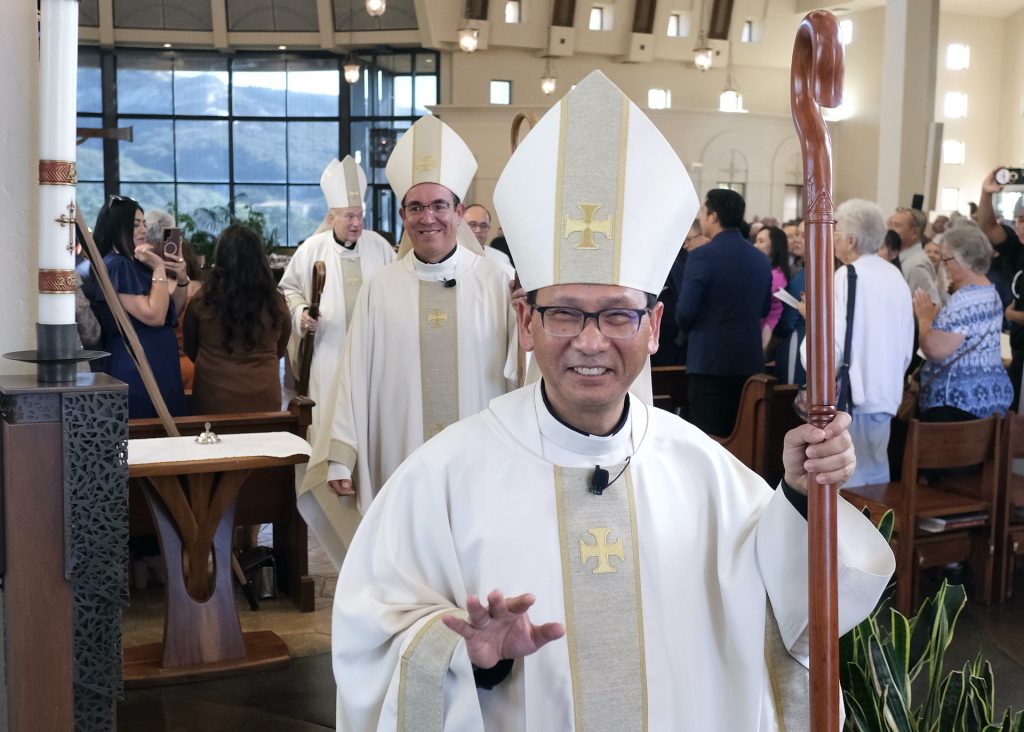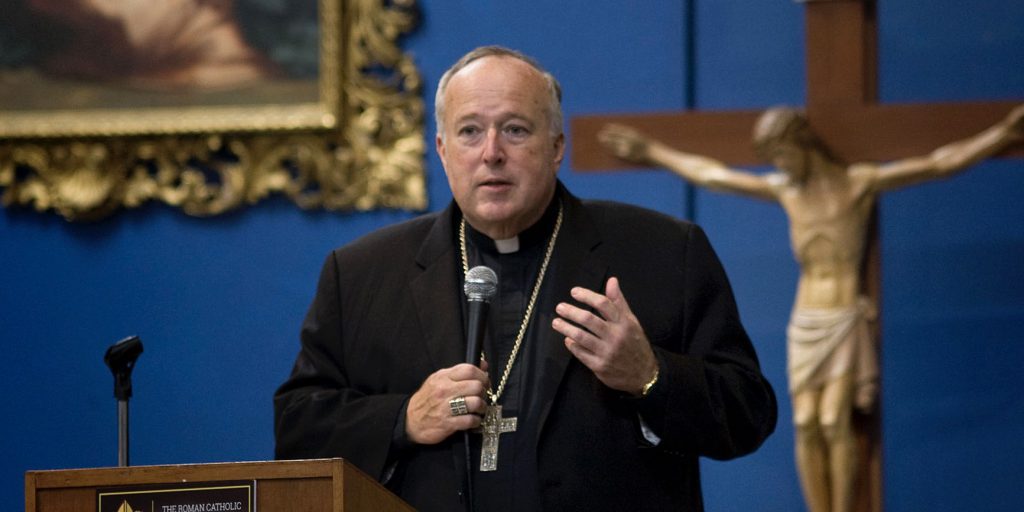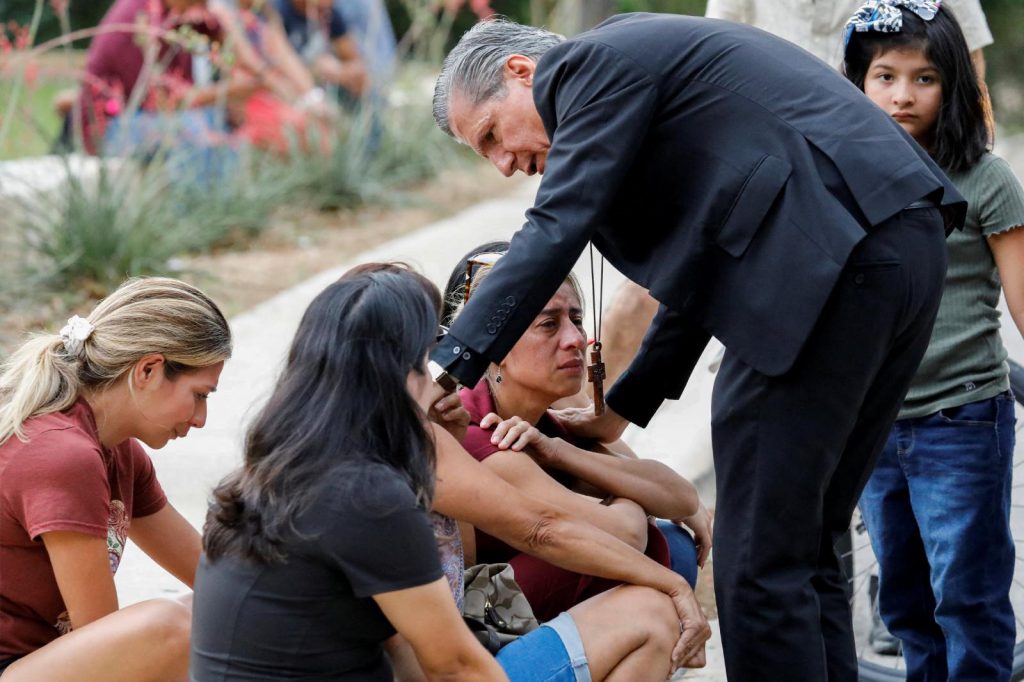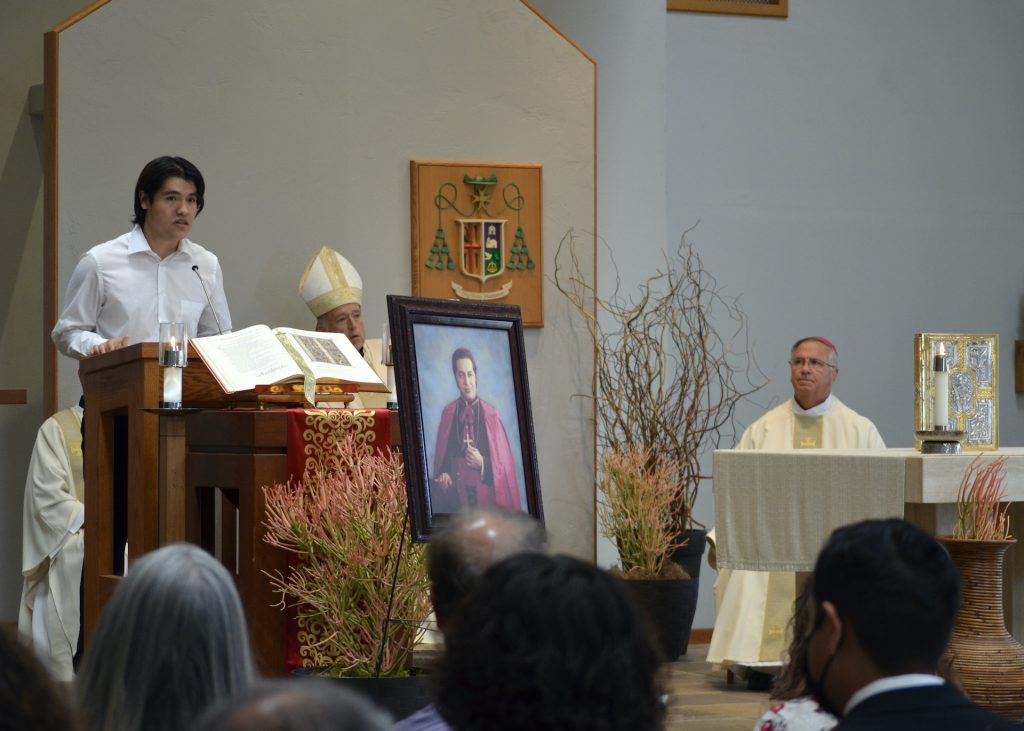SAN DIEGO — The pastoral mission of the local diocese in the coming months and years “must not be one of recovery, but of transformation.”
That’s how Bishop Robert W. McElroy described the work that lies ahead as he ordained Father Ramón Bejarano as bishop on July 14 at The Immaculata Parish.
Auxiliary Bishop Bejarano joins the diocesan leadership team that will help to lead that transformation, the bishop said, which includes not only continuing to respond to the pandemic but also to the unprecedented national movement for racial justice.
Near the end of the ordination, Auxiliary Bishop Bejarano gently shared how the pandemic had shaped virtually every aspect of his arrival in San Diego. And he gently acknowledged that he had a lot to learn in his new role, starting with how to wear his mitre, which he had a hard time doing the first time it was placed on his head.
“San Diego, now it’s your turn to train me to be a bishop,” he said, after thanking the faithful of the Diocese of Stockton who he said had trained him to be a priest.
He recalled that people across the country were ordered to “shelter in place” shortly after Pope Francis named him auxiliary bishop on Feb. 17. The lockdown lasted more than three months in California, delaying his arrival until July. And the day before his ordination Mass, county health authorities ordered some locales to close again to slow a resurgence of the virus.
“Are we going to have an ordination or not?” he said he asked. “But in the end, I am here to be your brother, I’m here to serve you, to pray for you and with you.
“Our trust and hope are in our Lord alone. And I know that for some reason He wanted me to be a part of history as one of the COVID-19 generation of bishops.”
Typically, an ordination Mass draws dozens of bishops, legions of priests from across the diocese and about 1,000 faithful. In contrast, less than 100 people attended Bishop Bejarano’s ordination, which was livestreamed, and a dozen bishops.
They included the president of the U.S. Conference of Catholic Bishops, Los Angeles Archbishop José Gómez; Cardinal Roger Mahony; and Most Rev. Christophe Pierre, the Apostolic Nuncio in the U.S.
The co-consecrators were Archbishop of San Antonio Gustavo García-Siller, who had been the spiritual director at Mount Angel Seminary in Oregon when a young Ramón Bejarano had studied there; and Bishop Myron J. Cotta of the Diocese of Stockton, where he had served for 21 years as a priest before being named bishop.
The auxiliary bishop’s mother, two brothers and sister were able to attend. However, members of his extended family and friends in Mexico, where he had grown up, were not able to travel to San Diego because of border restrictions implemented during the pandemic.
In his homily, Bishop McElroy said the nation was enduring a societal crisis. The pandemic was causing immense suffering, and “wearing us down and making us fearful.” At the same time, a diverse chorus of voices was demanding an end to racial injustice.
“The pandemic has transformed the landscape of our ecclesial life in ways that will permanently change the nature of pastoral action and evangelization,” he said.
Only about one-fourth of regular Mass-goers returned after public Masses resumed in San Diego County in mid-June, for instance.
The bishop saw a danger that the pandemic “is creating a culture of increased disengagement within the life of the Church that will persist long after a vaccination is found.”
At the same time, he said that society had reached a turning point as people confronted issues of race, nationality and immigration.
“We are in the midst of a profound social renewal in which the meaning of equality in our nation [is] being irrevocably changed for the better,” he said.
In response to these forces, he said, “the pastoral mission of the Diocese of San Diego in the coming months and years must not be one of recovery, but of transformation.”
He said a roadmap for this transformation is found in the theology and pastoral experience of the Church in Latin America, which is captured in the “Aparecida Document,” issued by Latin American bishops in 2007. Then Cardinal Jorge Bergoglio helped to develop it, and he promotes its teachings as Pope Francis.
The document offers guiding principles to keep the faith relevant in the face of shifting social conditions. They include faith leaders and faithful going out and searching for ways to proclaim the Gospel; helping each Catholic to have a personal encounter with Christ; promoting the simple lifestyle taught in the Gospel; working to protect the environment; and respecting and promoting prayer, including popular devotions.
The bishop said that the San Diego Diocese is an immigrant Church that has always drawn strength and identity from the men and women who have arrived seeking to build a new life. They include immigrants from Latin America, Europeans journeying west, military men and women, farmworkers who labor in the Imperial Valley, and, most recently, migrants from Asia and Africa.
He noted the trajectory of Bishop Bejarano’s life: born in Texas, raised in Chihuahua, and moving to the Central Valley as an 18-year-old who worked in the tomato fields.
“This experience has emblazoned in your heart and soul the essence of the immigrant experience and will make you an essential collaborator and architect in building up Gospel solidarity in our local Church,” the bishop said.
“And your thirst for justice in a world filled with injustice, especially for migrants, brings a fire for the social teaching of the Church and the renewal of our world to align it with the imperatives of the Gospel,” he continued. “We need that fire, that insight, that dedication to building a Church of both unity and diversity in Christ.”
Auxiliary Bishop Bejarano, meanwhile, acknowledged that because of his background, he would have greater involvement with the Latino community.
“But I am here to work together and to promote unity among everyone,” he said. “Please pray for me.”









